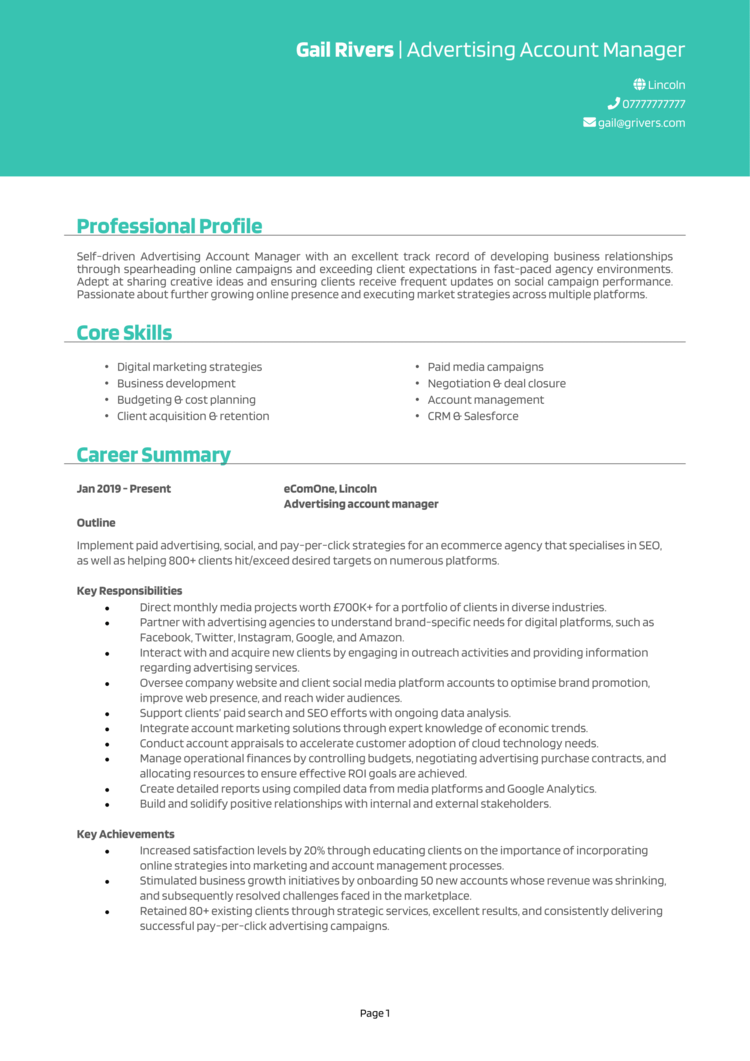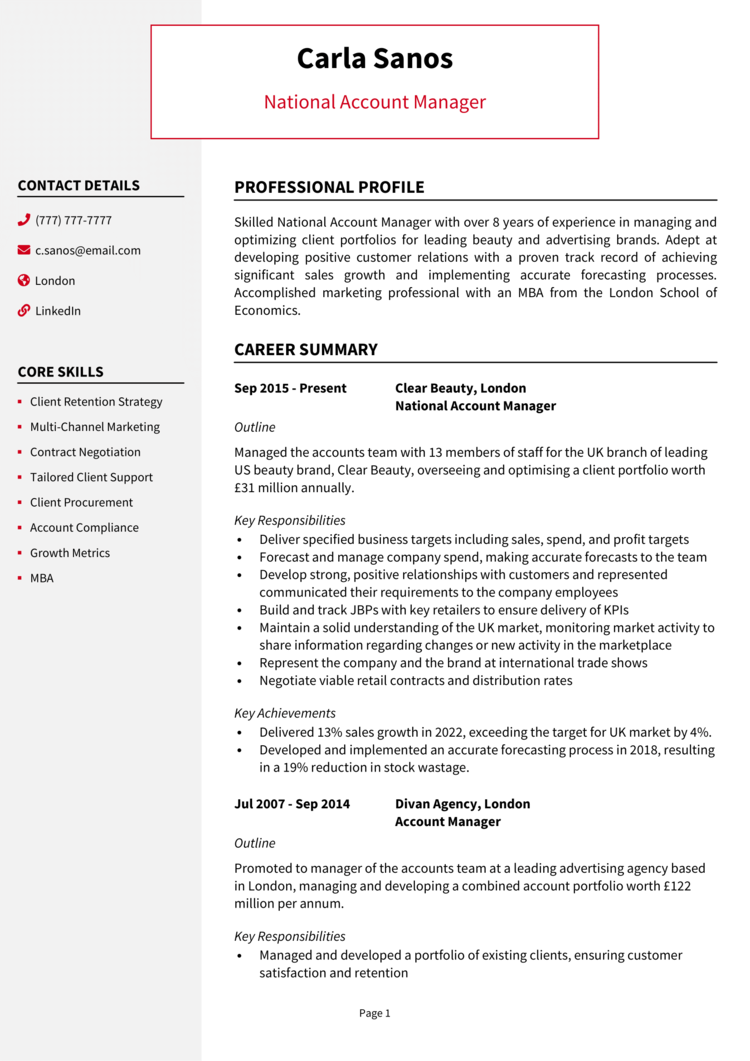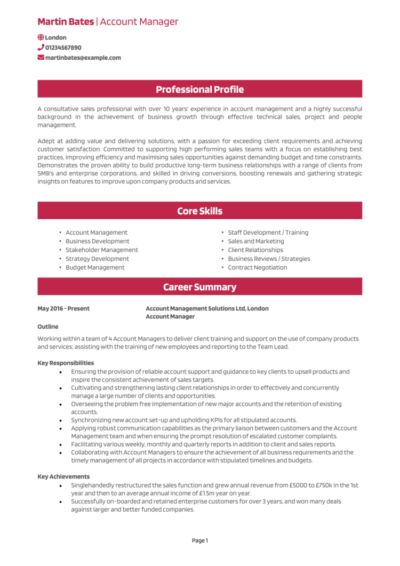As I’m sure you know, account management is all about an organisation’s relationship with their clients. Unfortunately, there’s one relationship you’ll need to focus on first: the one between you and a recruiter.
Your CV is a chance to show that you’re the trusted partner every company wants on board. This expert guide, along with some useful Account Manager CV examples, will fully equip you to craft an application that opens doors to your next big opportunity.
Account Manager CV example

Sales Account Manager CV

IT Account Manager CV example

Technical Account Manager CV

Advertising Account Manager CV

National Account Manager CV

How to write your Account Manager CV
Learn how to create your own interview-winning Account Manager CV with this simple step-by-step guide.
This guide will walk you through the process of writing an Account Manager CV, from sorting its structure and format, to highlighting the sales and relationship-management skills that make you the top candidate that any firm would be lucky to have.
Account Manager CV structure


Structuring your CV is like putting together a really, really important pitch deck: it needs to outline key information clearly and in a way that’ll keep your intended audience engaged and interested (and ideally, willing to put their trust in).
Here’s how you’ll need to structure your Account Manager CV:
- Name and contact details – Place contact details at the top so your soon-to-be employer can get in touch easily.
- CV profile – Begin with a concise summary of your account management expertise and achievements.
- Core skills – State your strongest and most relevant abilities, from relationship management to achieving sales targets.
- Work experience – List any previous roles in reverse chronological order, beginning with your most recent, and giving more detail to the most relevant.
- Education – Include academic qualifications and certifications relevant to sales or account management.
- Additional info – This section is optional, but it’s a good place for hobbies and interests that complement your professional profile.
Account Manager CV format


Your CV should be as polished and professional as the proposals you’re going to be delivering to clients. A clean, easy-to-read format ensures potential employers stick with it and keep reading.
- Bullet points – Break down information for quick skimming, just like a sales report.
- Divide sections – Use clear headings to make your CV flow logically, helping the recruiter comprehend everything.
- Use a clear font – Prioritise readability with a layout that conveys confidence and professionalism.
- No more than 2 pages – This keeps an employer’s attention while giving you ample space to highlight your expertise and experience.
Account Manager CV profile


Your CV profile is the strong opener that grabs a recruiter’s attention and makes them want to read more about you. For an Account Manager, it’s your chance to really convey why you would be able to contribute to their business’ growth.
Account Manager CV profile examples
Profile 1
Organised Account Manager with five years of experience in the technology sector, managing a portfolio of B2B clients. Skilled in nurturing client relationships, identifying upselling opportunities, and delivering tailored solutions that drive revenue growth. Proficient in using Salesforce to track performance and manage pipelines effectively.
Profile 2
Reliable Account Manager with three years in the FMCG industry, supporting a wide range of retail clients. Experienced in conducting regular client reviews, coordinating promotional campaigns, and achieving sales targets. Adept at using CRM tools to ensure seamless account management and customer satisfaction.
Profile 3
Dedicated Account Manager with over eight years in the financial services sector, specialising in managing high-value corporate accounts. Skilled in relationship building, cross-selling services, and delivering strategic insights to support client goals. Experienced in HubSpot and Power BI for account tracking and reporting.
What to include in your Account Manager CV profile
Tailor your profile to match the job description, ensuring it reflects the key skills and qualities the employer has already asked for in the job advert.
Here’s what to include in your Account Manager CV profile:
- Where you’ve worked – Mention industries or companies you’ve managed accounts for – absolutely mention the industry of the job you’re applying for, if applicable.
- Your top qualifications – Highlight any business degrees or relevant training.
- Essential skills – Focus on strengths that the company is after, like upselling and client retention.
- Stakeholders you’ve worked with – Mention your collaboration with clients, others companies, and internal teams.
- Types of accounts you’ve managed – Specify if you’ve helped enterprise accounts, high-value clients, or long-term partnerships, for example.
- Revenue impact – Highlight your role in growing account revenue or achieving sales targets.
- Relevant tools you know – They’ll likely be looking for someone proficient in CRM software like Salesforce, HubSpot, or whatever you’ve used in the past.
Core skills section


You might be wondering: how do you quickly convince a recruiter that you’ve got all the traits they’re hoping for? The core skills section is your answer. It’s a spotlight on your abilities which immediately offers a snapshot of why you’re the right fit for the role.
The best part is that they’re easy to tailor for the role. For example, you might want to emphasise client retention strategies if it’s a service-focused role you’re applying for, while you’d sooner mention lead generation for a sales-driven one.
And please, be specific: you’re not a “great communicator”, you’re an expert at “negotiating long-term contracts” and “presenting customised proposals to C-suite executives.” Your skills are worth bragging about at least a little bit.
Key skills for an Account Manager CV
- Client Relationship Management – Building strong, long-term relationships to drive customer satisfaction and loyalty.
- Upselling and Cross-Selling – Identifying opportunities to expand customer accounts by offering additional products or services.
- CRM Software Proficiency – Managing accounts and tracking sales using tools like Salesforce, HubSpot, or Zoho.
- Sales Target Achievement – Consistently meeting or exceeding sales goals through strategic account management.
- Contract Negotiation – Securing favourable terms while maintaining positive client relationships.
- Portfolio Management – Overseeing multiple client accounts to ensure satisfaction and maximise revenue.
- Lead Generation – Identifying and developing new business opportunities within existing accounts.
- Data Analysis – Interpreting sales data and client feedback to improve account strategies.
- Client Presentations – Delivering persuasive proposals tailored to client needs.
- Market Trend Analysis – Staying updated on industry trends to offer valuable insights to clients.
How to highlight work experience


Your work experience section is where you demonstrate your success as an Account Manager. It’s great to say that you can manage accounts, but a recruiter wants to know which accounts you’ve actually managed. They want someone who has proven that they can genuinely contribute to business growth.
List your roles in reverse chronological order, starting with your most recent or current position. Use bullet points to clearly outline your responsibilities and achievements, and include things like internships or smaller roles if you’re just starting out.
How to make your past experience easy to read for employers

- Outline – Provide an overview of the company, your role, and the type of accounts you managed.
- Responsibilities – Focus on your main duties, like managing client portfolios or developing account strategies. Use action verbs to convey impact.
- Achievements – Highlight measurable outcomes, such as revenue growth or client retention rates – more numbers are better!
Work history examples for an Account Manager
Account Manager | ABC Accounting
Outline
Managed a portfolio of mid-sized business clients for a SaaS company, focusing on relationship building and increasing product adoption. Worked closely with clients to identify opportunities for growth and resolve challenges.
Responsibilities
- Regularly engaged with clients to understand their needs and provide tailored solutions.
- Monitored account health and proactively addressed potential issues to improve retention.
- Identified and executed upselling and cross-selling opportunities, increasing revenue.
- Created and delivered presentations to showcase product value and updates.
- Maintained detailed records of client interactions and performance metrics in Salesforce.
Achievements
- Increased average account revenue by 15% through strategic upselling initiatives.
- Achieved a 95% client retention rate by delivering excellent support and value.
- Reduced onboarding time for new clients by 20% through streamlined processes.
Sales Account Manager | Matthew Clark Sales
Outline
Oversaw a portfolio of 25 key retail clients for a FMCG company, focusing on meeting sales targets and building long-term partnerships. Collaborated with internal teams to deliver tailored promotional strategies.
Responsibilities
- Developed account plans to meet sales and growth targets for each client.
- Conducted regular performance reviews with clients to assess results and refine strategies.
- Coordinated marketing and promotional activities to boost product visibility.
- Managed order placements and ensured timely delivery of products to clients.
- Used CRM tools to track sales performance and monitor customer satisfaction.
Achievements
- Exceeded sales targets by 18% year-on-year through effective account planning.
- Improved promotional campaign ROI by 25% by tailoring activities to client needs.
- Recognised as the top-performing Account Manager in the region for two consecutive quarters.
Financial Account Manager | ABC Financials
Outline
Managed high-value corporate accounts for a financial services provider, ensuring client satisfaction and identifying opportunities for cross-selling additional products. Focused on maintaining strong relationships to secure long-term partnerships.
Responsibilities
- Conducted quarterly business reviews with clients to align services with their objectives.
- Developed customised solutions to address specific client needs and challenges.
- Monitored market trends to provide clients with relevant insights and recommendations.
- Negotiated contract renewals and terms to maximise revenue and client retention.
- Maintained detailed client portfolios in HubSpot for accurate tracking and reporting.
Achievements
- Increased revenue from top-tier accounts by 20% through successful cross-selling strategies.
- Achieved a 98% contract renewal rate by fostering strong client relationships.
- Delivered tailored reports that improved client decision-making, leading to higher satisfaction scores.
Education section


The education section is where you’ll list your academic background and all of your relevant certifications. This might include a degree in a business-related field and any sales or account management training you’ve done.
If you’re newer to the field, highlight coursework or projects that demonstrate your knowledge. All in all, experienced candidates can keep this section brief.
Make sure your qualifications are listed in reverse chronological order, starting with the most recently-earned one.
Qualifications recruiters look for in an Account Manager
- Bachelor’s Degree in Business, Marketing, Communications, or a similar field
- Certified Key Account Manager (KAM)
- Salesforce Experience Cloud Consultant
- HubSpot Sales Software Certification
- Level 4 Diploma in Sales and Marketing Management





